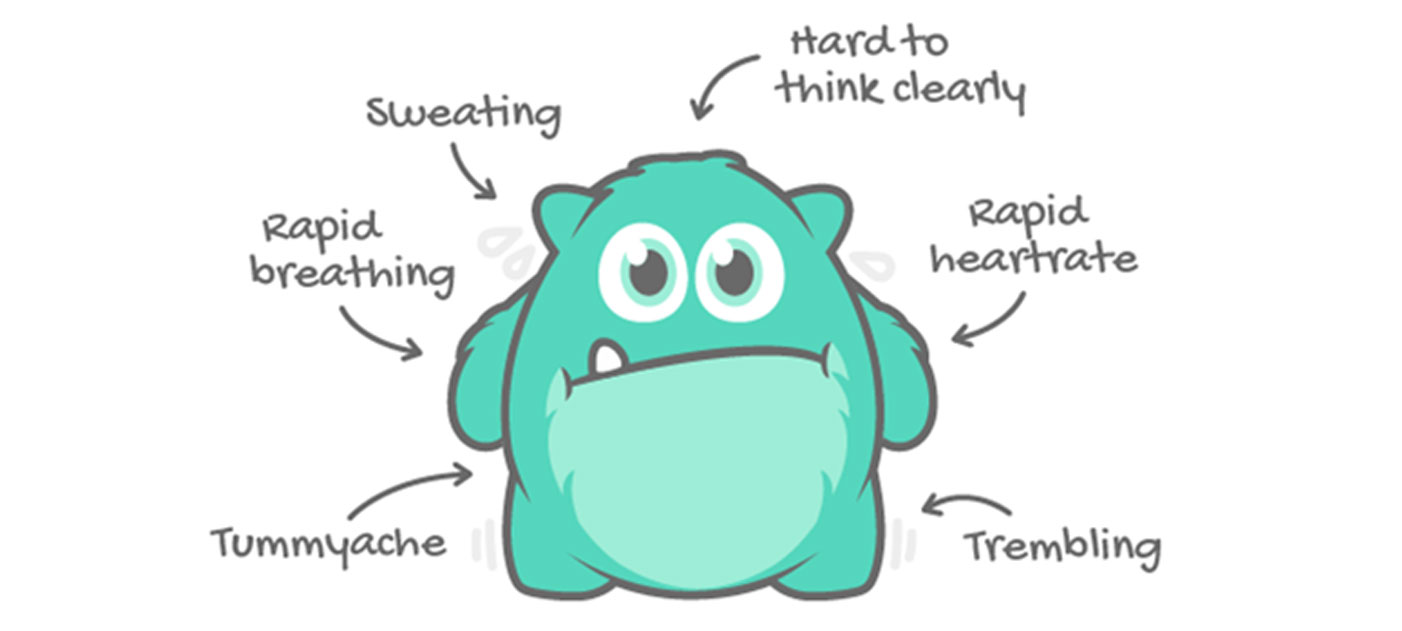Enrich your knowledge with our informative blogs
List of Easy Ways to Catch Symptoms Early and Overcome Math Anxiety.

Do you feel nervous while performing mathematical calculations? Do you also suffer from the fear of doing math? Then remember you are not alone! You may be suffering from math anxiety only! Here’s all you need to know about it!
TABLE OF CONTENT
- Introduction
- What is math anxiety?
- Causes of math anxiety
- Contributing factors
- Quotes often said by an anxious student
- Signs and symptoms
- Coping with math anxiety
- Additional tips
- Bottom Line
Introduction
Math is not only about performing calculations and limiting students to textbook problems only. Maths is a way of life that is used at almost every phase of life.
Whether you go to the business world, choose a career option, or buy something, everything includes the math calculations. So, the students need to understand the answer to “WHY” behind what they are learning.
It is fair to say that math is not everyone’s cup of tea or say it is not everyone’s favourite subject. For many people, it is indeed a matter of anxiety and a feeling of tension that arises whenever they think about solving the equation.
- What exactly will be the correct answer?
- Will I be able to find the correct answer to the equation?
- How to solve the equation?
- Will it affect the grades?
- Will I be able to pass the examination?
- Will it affect my image in front of society?
And many more, these questions result in a child starting to avoid the things involving maths in it rather than choose to cope with it.
If this is the same case with you, let us dive into the topic to determine what measures can help your child shine in maths and overcome their weakness.
What is maths anxiety?
Mathematical anxiety, often known as math phobia, refers to one’s ability to do maths. Students often develop a sense of anxiety towards the math subject, and as a result, they end up avoiding the mathematical calculations.
Looking into the essentiality of addressing the problem, you will be happy to know that now the problem of math anxiety can be addressed by just following a few essential tips.
Yes, you heard it right! But before thinking of overcoming math anxiety, it is essential to get familiar with the causes of math anxiety so that you can quickly get the indication when your child needs help from you.
Causes of math anxiety
- Fear of being wrong: The fear of being wrong or always being proper to maintain a strong image in front of the other students is also the basis of a child suffering from math anxiety.
- Parents’ negative predispositions: Positive attitude towards the child can drastically change the student’s perceptions of doing something well. Consequently, the negative predispositions can actually break the whole scenario into a completely different zone.
- The pressure of timed tests: The deadline of time limits imposed on students makes them feel anxious. This leads to forgetting concepts and only focusing on the grades. However, the tests can negatively impact the grades due to fear, so the failure is probably more. This indeed creates a vicious circle that is challenging to break.
- Teacher influence: Students quickly pick up their teacher’s feelings about the subject. If the teacher has a positive attitude and stays excited while teaching maths, the same will be reflected in students.
While if the teacher is negative and least interested in explaining the concepts well, the same effect will be seen in students.
- Unwillingness to complete assignments: The act of avoiding the mathematical calculations due to a mindset of disinterest in the subject or unwillingness to perform it can be a more significant cause of the anxiety.
The positive approach and genuine support can help the child to cope with the anxiety well.
Other factors that contribute to math anxiety
- Bad grades at school
- Lack of encouragement from teachers or parents
- Gender stereotypes
- Lack of positive role models
- Math problems being used as a punishment in schools
Several quotes are often said by students suffering from math anxiety!
- Some people can do math- not me!
- Whenever I look at a math problem, my mind goes completely blank!
- Math subjects and exams terrify me! My palms get clammy, I breathe fast and whatnot!
Math anxiety: Signs and symptoms
If your child seems struggling particularly with math concepts or grades, then do not forget to look for these math anxiety symptoms. Probably your child needs your help to cope up with the subject.
- Negative Self-talk
Students experiencing math anxiety often witness negative self-talk as a common symptom. Is your child also doing the same?
Does your child use the statements like “I will never be good at maths”, or I am unable to solve mathematical equations, or I hate math? If yes, then probably your child needs help with the subject.
- Unusual nervousness while working on mathematical equations or thinking about it.
Even thinking about the math subject can be enough reason to cause stress to the student. They often feel nervous while thinking about the subject or working on it.
- Panic during tests
The traditional classroom environment becomes the primary stress source for a student, especially during a test or they are expected to contribute in the class.
- Intense emotional reactions
Math anxiety manifests emotionally as well. In this case, students quickly start panicking, get teary-eyed, or grow angry during math class.
- Permanency feeling
When math is not a specific student’s strong suit, they instantaneously believe that it is just the way it is and nothing can be done about it. And the moment they start believing this, they quickly give up and lower down their motivation.
- Low achievement
Due to the lack of confidence, answering the questions appropriately during a test is never an option. And as their exposure to the subject decreases, it drastically affects the overall performance.
- Avoidance
Ample students experiencing math anxiety choose to avoid the math lectures, tests, or quiz. The reason is that they try to find an escape from the subject, and so they start avoiding it. Indeed it has become a nightmare to them, which is why they often do this.
- Physiological effects
The research studies have suggested that the students with math anxiety experience increased heart rate, nervousness, upset stomach, clammy hands, and lightheadedness.
How to overcome math anxiety?
Out of many students classified to be bad at math, many could be experiencing math anxiety which is undoubtedly a solvable problem.
Yes, you heard it right!
The maths fear is a real phenomenon among school children and several others in different phases of life. Many people get nervous about calculations when it’s their turn to calculate, while many are unable to solve the problem in front of others.
The scenarios can be different, but the good news is that now you can overcome math anxiety by adopting some essential tips! Do not let your child suffer from math anxiety.
- Encourage a growth mindset.
Research studies have shown that effort turns ability when it comes to learning and understanding math. Encourage your child’s efforts and then set high expectations.
- Get a private tutor
Tutors can have a considerable impact on a student’s feelings and mindset toward math subjects. Tutors are generally proficient at providing the personal attention that is usually hard to get at the school.
It gives the students enough opportunity to share their problems and confusions about the subject openly and boosts their confidence simultaneously.
- Take baby steps
You don’t need to take the vast steps like you want to do it quickly. Take some baby steps and move slowly.
Take enough time to solve an equation, understand the problem and then practice a lot to get those results in time stringent tests.
- Be involved
Students show positive and productive results when they are treated with a positive attitude and enough support.
Being a tutor or a parent, you must involve the child to do the calculations and clarify their doubts quickly to see the actual change in them.
- Make maths fun
What will be worse than a child experiencing anxiety and a tedious maths teacher drowning in the mathematical equations that are complicated to understand, and you have o clue how to deal with those 50 minutes of class?
Let us consider the second scenario where studying maths is no longer a burden, and you can understand the maths concepts with fun learning activities. Interesting right!
That is what you need to do so that your child never seeks an escape whenever they get to hear the word “MATHS”. Make mathematical concepts a fun learning activity to overcome math anxiety.
- Positive Reinforcement
Imagine you being bad at mathematics and your friend constantly laughs at you and your inability to solve the mathematical problems. Embarrassing, no?
But not anymore, as with positive reinforcement, you can help your child with those problems and from the upcoming embarrassment due to their inability to solve mathematical problems.
Parents and teachers both can develop positive associations with math. Instead of giving mathematical questions as a punishment for wrong answers, encourage the child to complete the work by promising a reward.
- Using mixed ability grouping
It sounds embarrassing to group the class in several parts and label them with strong or low students. Confusing? You must have heard about the different grouping systems in the school of weaker students and good performers.
Indeed, a common activity is often performed in the schools, but instead of doing it this way, if the grouping is done in a manner that high and low students are grouped, it will be more helpful in boosting morale.
Yes! Grouping high with low eradicates the sense of insecurity and also lets them grow by working and learning altogether. And this is what mixed ability grouping says.
It is basically a learning method that groups together the peers having different abilities. Not every student is good in the same subject. However, mixing students well in different subjects can be a powerful way to balance the talents at equal levels and produce better results.
- Turn mathematics anxiety into excitement.
If the student feels like they cannot solve a problem or get anxious while solving one, you must reframe their negative thoughts to the positive ones. Do you know how?
Well, you can do this by introducing simple real-life associations with the problem. Kids learn faster when they can relate things quickly with the daily life things that are familiar to them.
Frame some mathematical problems, associate them to daily activities, make the kids understand the association, and then give them time to solve the problems similarly. You will see a massive difference in their state of mind concerning math problems.
- Encourage understanding over memorizing.
Understanding the method and memorizing by rote are the two ways considered as the learning methods.
Students generally learn by memorizing constantly to attain the lower results, while the ones understanding the concepts are likely to think outside the box while solving the math equations.
So instead of encouraging the memorizing technique, try the efficient way out of encouraging the understanding method.
- Allow mistakes
Everyone who tries makes mistakes! So instead of punishing the child for their mistakes, allow them to make mistakes.
Making mistakes indicates that your child is trying and putting some effort into getting the desired outcome. Every move should be appreciated.
- Be positive about math.
To understand the subject well, you must first change the perception and need to be optimistic about the subject.
Your perception influences your willingness to deal with the subject well and becomes a substantial contribution to achieving the desired outcome.
Additional Tips to overcome the math phobia
- Practice math daily
- Apply math in real life
- Utilize resources
- Study smart
- Get organized
- Ask questions about your doubts
- Try some relaxing or breathing exercises
What can you say to yourself?
| Instead of saying | Try thinking |
| I am not good at maths | What am I missing out on? |
| This is too difficult | This needs a little more time and effort |
| I just can’t do math | I need to train my brain in math |
| Oops I made a silly mistake | This mistake I am not going to repeat. |
Just because it is difficult doesn’t mean you shouldn’t try; it means that you should try even harder!
Bottom Line!
Math is a comprehensive learning process! In other subjects, you learn and understand the concepts, but you understand and work on them in maths.
Every child learns differently, instead of imposing the same methods on everyone and enhancing their anxious feel concerning the subject, try to help them cope with it.
Try adopting the above-mentioned tips and support your child fighting this enemy named “MATH ANXIETY” or “FEAR OF MATHS.”
Mathematics is a nightmare for many but don’t let it be one for your child!

Unleash the Power of visualization to break tough concepts
Wanna be the next Maths wizard? Discover the new way of learning concepts with real-life Visualization techniques and instant doubt resolutions.

Get your doubts resolved ON THE SPOT!
Make learning interesting and fun when the doubts are resolved instantly with the comfort of your home only at TEL Gurus.

Follow the route to success by escaping the traffic
No need to rush and face the traffic everyday with Online classes rendered by TEL Gurus. Paver your road to success today!
Categories
Recent Posts
- List of the qualities you should look for in your tutors?
- What is the most useful formulas in math?
- Describe the process of eating to defecation of food?
- Difference between the natural and artificial active response by the immunology system.
- Explain the different circle theorems
- How are nerve cells adapted to their function?











